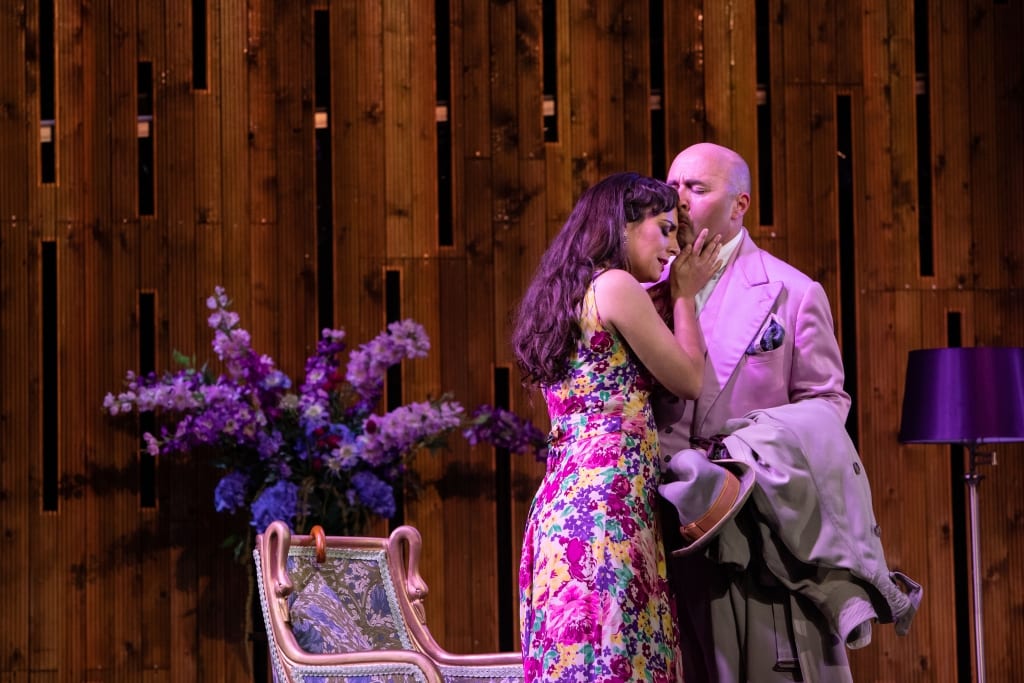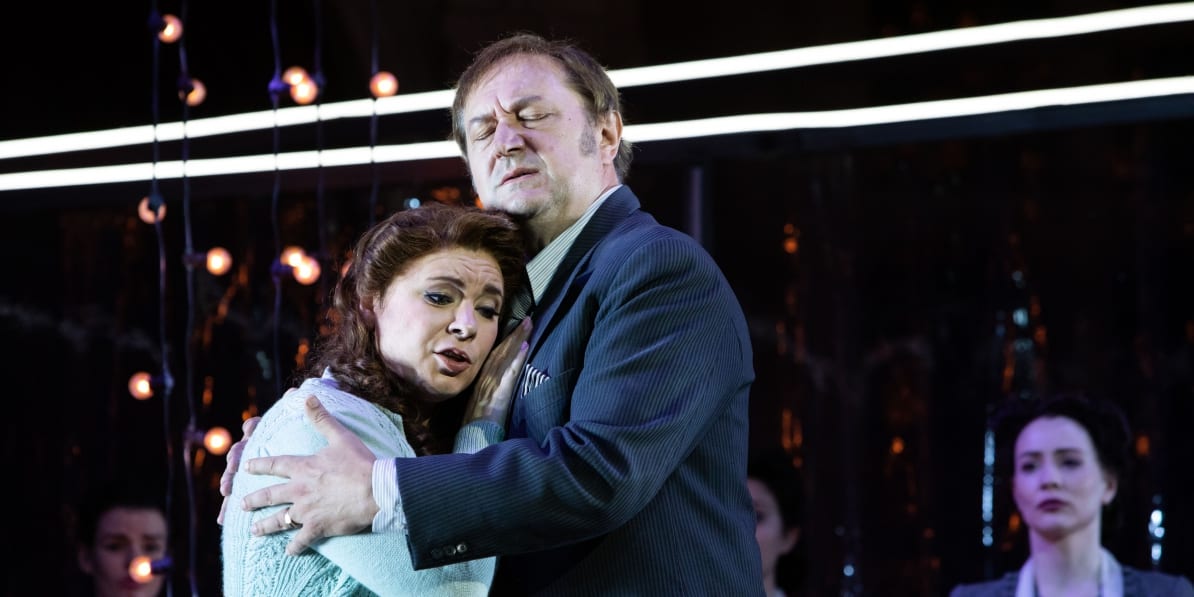Giving voice to two overlooked operas in this double-billed programme, Opera Holland Park’s 2019 summer season is in its penultimate production. Ermanno Wolf-Ferrari’s one-act opera, Il Segreto di Susanna, is a work that adheres to the lightness of Italian opera buffa. The work’s libretto, written by Enrico Golisciani, discusses the trivialities of domesticated, married life. Count Susanna — audacious in rejecting societal norms, has developed a taste for smoking cigarettes behind her husband’s back. Upon his return, the remnants of tobacco fog lead Count Gil to speculate his wife’s possible infidelity. This pantomime-esque work is paired alongside Tchaikovsky’s Iolanta: a tale of a young girl’s coming into the light — both figuratively and literally.
The first of the two: Susanna, is presented under the direction of John Wilkie. The scene is set with the conventions of an affluent bourgeois family — oak drinking cabinet, vases of flowers, and quilted armchairs. John Savournin as Sante; the knowing and witty butler, is the first to grace the scene. Assertive in directing the maids; Naomi Kilby and Kirsty McLean, the trio are comedic in demeanour. Accentuating the mundanities of domestic life through exaggerated choreography — complete with feather-dusters, the trio are charming. Savournin’s projection is effective, and his gesticulations, which often mirror that of a French mime artist, make his appearance all the more endearing.

Playing Susanna is Clare Presland, who captures both the glamorous and deceitful components to the role’s complexity. Presland’s control of varying vocal registers is masterful, and she maintains the coy and prim archetype that her husband expects. Whilst smoking was thought of as a luxury for men in the past, OHP’s choice to mock gender stereotypes was refreshing — society’s attitudes have since shifted to a greater progressive outlook. Presland’s acting was of excellent calibre — certain scenes had her in awkward angles to sing, though this did not alter her vocal or acting ability at all.
Richard Burkhard’s portrayal of Count Gil was equally as strong. The affirmation of patriarchal power came across through both the sheer projection of his voice and his overbearing demeanour. Desperate to position himself as control of both his wife and house alone, Burkhard’s most striking moment was the final duet between him and Presland, where the secret finally unravels — Susanna’s secret was smoking, not having an affair, after all.
Under the baton of John Andrews, the City of London Sinfonia were immaculate. The lyricism of the ascending lines created an almost tangible smoke to mirror that of Susanna’s cigarette. The timpani was most effective, typifying the work’s slap-stick quality.
The second of the double-bill was Tchaikovsky’s Iolanta. Whilst Tchaikovsky’s better-known operas — Eugene Onegin and The Queen of Spades are works that seep emotional heft, Iolanta’s slightly convoluted plot has been on the backburner of his canon for perhaps that very reason. That being said, OHP’s excellently cast production, under the direction of Olivia Fuchs made up for the disjointed libretto.
Natalya Romaniw’s Iolanta was graceful from the get-go. Her fragility was characteristic of the teenage girl she was to depict, and her vocal control further embodied it. During moments of pathos, Romaniw’s delicate pianissimi were executed perfectly, whilst the scenes of frustration were met with projection exuding genuine gravitas. Alongside her as Count Vaudemont was David Butt Philip. Stage presence, vocal dexterity and most strikingly, projection, came almost as second nature to the tenor. With seamless transitions between the head and chest voice, Butt Philip’s silky transitions were captivating — no doubt that princess Iolanta falls for him.
Returning to the role over a decade on, Mikhail Sveltov’s King Rene is dignified though tender, capturing both the fury and guilt of his daughter’s misfortune. Grant Doyle’s portrayal of Robert was self-sacrificing and the role’s comradery was articulated with ease. Laura Woods’ Marta was most sincere — exuding a careful lyricism.
The OHP chorus, however, were the most striking component to this production. Matched, attentive to one another, and unrelenting in projection, the singers’ wall of sound streamed beautifully over the London Sinfonia. Notably, Sian Edwards’ control of the orchestra was also impressive — an evening enveloped with stirring pathos.

